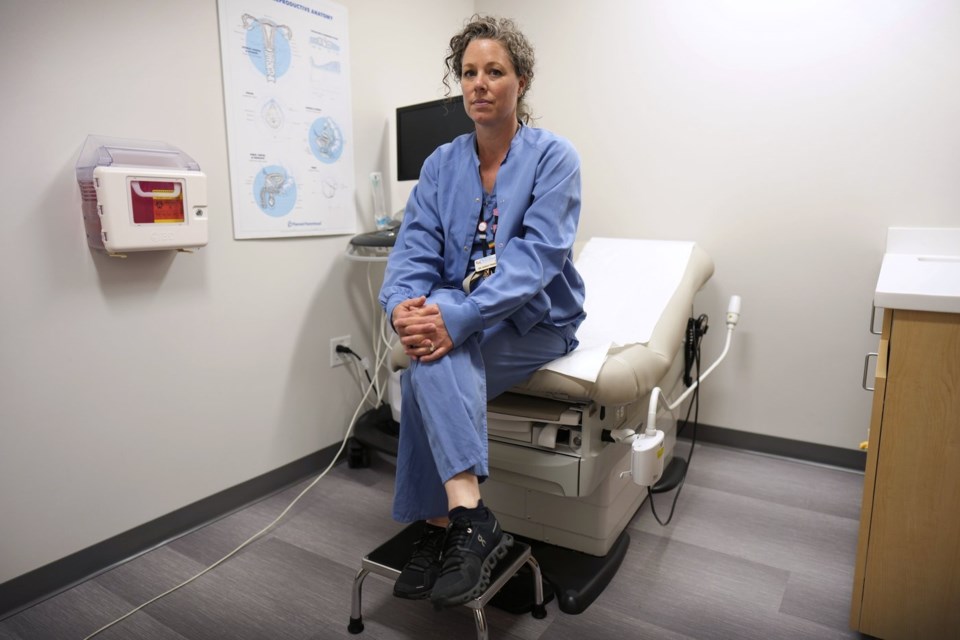AMES, Iowa (AP) — Iowa's law banning most abortions after about six weeks of pregnancy goes into effect Monday, a drastic change that enrages — but doesn't surprise — Sarah Traxler.
When Traxler, an OB-GYN based in Minnesota and the chief medical officer of Planned Parenthood North Central States, went to high school in a conservative Louisiana town in the 1990s, she saw abortion rights losing ground even then, decades before the U.S. Supreme Court and Iowa’s high court would say there isn’t a constitutional right to abortion.
“The protections of Roe have just been chipped away at slowly through time,” she told The Associated Press.
At 8 a.m. Monday in Iowa, the state will join more than a dozen others where abortion access has been sharply curbed in the roughly two years since the Supreme Court overturned Roe v. Wade.
It’s an outcome Iowa’s abortion providers have been fighting but still prepared for, shoring up abortion access in neighboring states and drawing on the lessons learned where bans went into effect more swiftly.
States with restrictive laws are “glimpses of our future,” Traxler said. Even with the ability to prepare, she told reporters Friday, “this transition is devastating and tragic for the people of Iowa."
Iowa's Republican-controlled Legislature approved the law last year, but a judge blocked it from being enforced shortly after the measure went into effect because of a lawsuit from the American Civil Liberties Union of Iowa, Planned Parenthood and the Emma Goldman Clinic in Iowa City.
The Iowa Supreme Court reiterated in June that there is no constitutional right to an abortion in the state and ordered the hold to be lifted. The district court judge’s July 22 orders set July 29 as the first day of enforcement.
The law prohibits abortions after cardiac activity can be detected, which is roughly at six weeks of pregnancy and before many know they are pregnant. There are limited exceptions in cases of rape, incest, fetal abnormality or when the life of the mother is in danger. Previously, abortion in Iowa was legal up to 20 weeks of pregnancy.
The U.S. Centers for Disease Control and Prevention found 44% of the 3,761 total abortions in Iowa in 2021 occurred at or before six weeks. Only six abortions were at the 21-week mark or later.
Alex Sharp, senior health center manager who runs the Planned Parenthood abortion clinic closest to Des Moines, said staff members overbooked schedules this week, moving up appointments for people seeking abortions who likely would be past the legal limit as of Monday.
Still, that wasn’t an option for everyone. Almost a third of the people Sharp spoke to said they couldn't get off work or find daycare before next week. Those patients could work with staff members to find appointments out of state, she said.
Across the country, the status of abortion has changed constantly since the Supreme Court’s decision in Dobbs v. Jackson Women’s Health Organization, with trigger laws immediately going into effect, states passing new restrictions or expansions of access and court battles putting those on hold.
In states with restrictions, the main abortion options are getting pills via telehealth or underground networks and traveling, vastly driving up demand in states with more access.
The Guttmacher Institute, which supports abortion rights, projected last month that about 20,000 abortions were performed in Kansas in 2023, or 152% more than in 2020. Near Iowa, Illinois saw a 71% increase and Minnesota went up 49%. Providers there expect to see more influx after Monday.
When the first restrictive laws went into effect, like in Texas, providers had to essentially “figure it out as we went,” said Amy Hagstrom Miller, founder of Whole Woman’s Health. And even though providers across the country have learned how to work within the limits, “I don’t ever want us to have this seem normal."
Hagstrom Miller has been talking with leaders at the independent Emma Goldman Clinic about accepting referrals at the Whole Woman’s Health clinic in Minnesota, where 20% of abortion appointments go to out-of-state travelers, she said. That percentage is expected to increase under Iowa's new law.
The region’s Planned Parenthood affiliate also has been making investments for over a year to prepare for Monday. A location added last year in Mankato, Minnesota, is only an hour's drive from Iowa and recently began providing medication abortion. Just over the state line in Omaha, Nebraska, a facility is quadrupling exam rooms and adding staff.
Maggie DeWitte, who has worked for decades to advocate against abortion access in Iowa, said it's to be expected after Dobbs that while some states work to regulate or even eliminate abortion, others are going to be less restrictive.
“We certainly hope that women would not travel out of state, but we know that that is going to happen,” she said. "So that just has to continue our education efforts to those women to let them know that there are other options out there.”
Many people don’t know the law was passed or is going into effect, making those conservations even more sensitive. Staff members have had to tell patients they are too far along and it’s too late unless they travel and miss more work, Planned Parenthood’s Sharp said.
It's been difficult, she said, even though clinics are as ready as they can be for Monday.
“We are prepared operationally for it,” Sharp said, “but not emotionally or mentally for it, at all.”
___
Mark Vancleave in Bloomington, Minnesota, and Geoff Mulvihill in Cherry Hill, New Jersey, contributed to this report.
Hannah Fingerhut, The Associated Press




